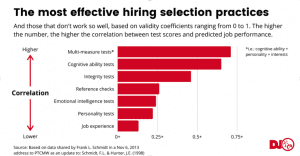How to Make Sure Remote Candidates Can Do the Job


In the past year, the workplace as we know it has changed dramatically. Suddenly, hundreds of jobs that were equipped and designed for in-office productivity were forced to reconsider their approach. With the coronavirus sending employees home to pick up the slack from their couches, dining room tables, and back porches, businesses were faced with a new dilemma.
Not only do they suddenly need to reconfigure their everyday work schedule to fit the work from home model, but they also need to make sure that employees are still able to be as effective as they were in the office. And remote work requires its own set of skills that you may not have prioritized in the past.
The best way to save time and money and avoid mis-hires is to reassess your hiring process and make sure that you’ve set yourself up for success. This is easier said than done, but with the right tools, the process can be seamless. You just have to follow a few remote hiring guidelines and you’ll be able to make effective hires whether they’re in-house or remote.
Online Assessments
The average job posting brings in 250 applications. That’s a lot of resumes. How do you determine who has the skills to do the job?
One of the most effective methods, especially when vetting remote candidates, is pre-employment testing. Online skills assessments can help you determine whether or not a candidate has the skills they’ll need to get the job done before you even look at their resume.
These tests can range from cognitive ability tests, situational judgment tests, personality tests, skills tests, coding tests, and culture add tests. Research shows that it’s best to use a multi-measure test that combines different test types.

You can create your own tests, or use a company like TestGorilla that offers a large library of pre-written tests that allow you to build the assessment that best meets your needs. This way, you have the confidence of knowing that you are only spending time on qualified candidates, while also saving you hundreds of hours on the vetting process.
Behavioral Interview Questions
Once you have passed promising candidates through the initial screening process, it’s time to bring them in for an interview. Good interview questions are critical, and this may be the only face-to-face time you receive with this potential employee before a decision is made. That said, you’ll want to determine whether or not this person is fit for the job as quickly as possible.
One proven way to do this is to ask a series of behavioral interview questions. Examples of these questions include:
- Describe a time when you struggled to build a relationship with someone important. How did you eventually overcome this?
- Tell me about a time when you needed to get information from someone who wasn’t very responsive. How did you go about that?
- Give me an example of a time you faced a conflict while working on a team. How did you overcome that?
While it’s certainly important to evaluate the work that your candidates are capable of, it’s equally important to understand how they work with others, and how they overcome conflict. Especially in a day and age where remote work is the new normal, communication and effectively working together are imperative. These questions go beyond the simple “tell me your preferred communication style,” by having candidates reflect on their past experiences, and provide details through real-world experiences they can share during the interview.
Paid Trials
Once you have narrowed your list of candidates down to your top choices, a great way to vet your candidates is to put them through a paid trial run. This tactic is useful across several job positions and can take many forms. For example, if your company is looking for a copywriter, you might have them write an article or edit some copywriting that needs work. When they turn it in, you’ll be able to see firsthand whether or not they can do the job.
Running tests like this for several candidates allows you to compare each project side by side to decide who is the best fit for your open role.
The Bottom Line
During this period of increased remote work, there is no time to waste. The last thing you want is to hire an employee and spend the time and money training them only to find out that they aren’t a good fit. Each new hire is critical to your growing business, and even one wrong turn could cost your company thousands of dollars. Screening processes like trial evaluations, smart questions during interviews, and skills assessment tests all contribute to making a successful new hire.
For more information on how to hire remote employees, check out Dynamite Jobs’ remote hiring blog.
About the Author:

Roy Harmon is the Managing Editor of TestGorilla’s human resources blog.
Follow TestGorilla on Social Media: LinkedIn, Instagram, Facebook.
Related Posts:


Featured Remote Jobs
 New Job! Featured Job Remote Job
New Job! Featured Job Remote Job Opened 2 days ago Featured Job Remote Job
Opened 2 days ago Featured Job Remote Job Opened 2 days ago Featured Job Remote Job
Opened 2 days ago Featured Job Remote Job Opened 2 days ago Featured Job Remote Job
Opened 2 days ago Featured Job Remote Job Opened 2 days ago Featured Job Remote Job
Opened 2 days ago Featured Job Remote Job Opened 2 days ago Featured Job Remote Job
Opened 2 days ago Featured Job Remote Job Opened 2 days ago Featured Job Remote Job
Opened 2 days ago Featured Job Remote Job Opened 2 days ago Featured Job Remote Job
Opened 2 days ago Featured Job Remote Job Opened 4 days ago Featured Job Remote Job
Opened 4 days ago Featured Job Remote Job Opened 5 days ago Featured Job Remote Job
Opened 5 days ago Featured Job Remote Job Opened 5 days ago Featured Job Remote Job
Opened 5 days ago Featured Job Remote Job Opened 6 days ago Featured Job Remote Job
Opened 6 days ago Featured Job Remote Job Opened 9 days ago Featured Job Remote Job
Opened 9 days ago Featured Job Remote Job Opened 9 days ago Featured Job Remote Job
Opened 9 days ago Featured Job Remote Job Opened 9 days ago Featured Job Remote Job
Opened 9 days ago Featured Job Remote Job
